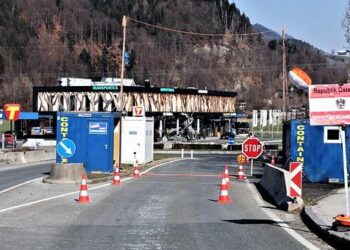In a surprising development at the ongoing Russia-Belarus “Zapad-2025” joint military exercises, US military officers made an unexpected appearance, marking a rare instance of direct engagement amid heightened geopolitical tensions. The presence of the American officials at the large-scale war games, which are closely watched by global analysts for indications of regional security dynamics, underscores the complex interplay between NATO and Russian-led military alliances. This article delves into the implications of this unprecedented visit and its potential impact on international military diplomacy.
US Military Officers Attend Zapad 2025 War Games Signaling Heightened Western Interest
The unexpected presence of US military officers at the joint Russia-Belarus military exercise has sparked widespread analysis within strategic circles across the West. This move marks a notable shift in Western military observation tactics, highlighting a desire to obtain firsthand insights into the capabilities and strategic approaches employed during these large-scale maneuvers. Attendees were reported to have closely monitored key drills, including simulated electronic warfare and combined arms operations, signaling a comprehensive effort to evaluate the evolving military doctrines of both nations.
Observers emphasize the broader implications for international military diplomacy and intelligence-sharing protocols. Key points emerging from initial reports include:
- Enhanced transparency: The presence suggests an unprecedented level of openness compared to previous exercises.
- Strategic signaling: An implicit message underscoring the importance of managing potential escalations through observation.
- Information gathering: Detailed assessments aimed at updating Western defense readiness and contingency planning.
| Aspect | Details |
|---|---|
| Location | Belarus training grounds |
| Duration | Two weeks |
| Focus Areas | Electronic warfare, troop coordination, missile defense |
| Western Attendance | Small delegation of officers |
Strategic Implications of US Presence at Russia-Belarus Military Exercises Analyzing Potential Shifts in Regional Security
The unexpected involvement of US military officers in the Russia-Belarus joint exercises introduces a complex dynamic to an event traditionally viewed as a demonstration of Moscow’s strategic coordination with Minsk. This presence signals a remarkable shift in diplomatic and military engagement, suggesting that Washington might be seeking direct observation to recalibrate its regional threat assessments or possibly engage in backchannel communication. The surprise appearance emerges in a period marked by heightened tensions and competing security interests across Eastern Europe, potentially redefining how NATO and its allies approach collective defense strategies near Russia’s western borders.
Strategic consequences of this development could include:
- Enhanced transparency and intelligence-gathering on Russia and Belarus’ military capabilities and tactics.
- Increased diplomatic leverage for the US in future negotiations related to arms control and regional security frameworks.
- Potential recalibration of NATO’s posture and readiness along the eastern flank, incorporating real-time insights.
- Stimulating internal discourse within Russia and Belarus regarding the balance between cooperation and confrontation with Western powers.
| Aspect | Potential Impact |
|---|---|
| Military Transparency | Improved US intelligence on tactics and hardware |
| Regional Deterrence | Boosted NATO readiness along eastern borders |
| Diplomatic Channels | Opened possibilities for direct Western-Russian talks |
| Internal Political Dynamics | Prompted debates within Russia and Belarus on managing Western relations |
Recommendations for Diplomatic Engagement and Enhanced Military Transparency Amid Rising Tensions
As geopolitical tensions escalate, it is imperative that all parties involved prioritize open channels of diplomatic engagement to mitigate misunderstandings and prevent inadvertent conflict. Constructive dialogue between military leaders, diplomats, and policymakers can foster mutual trust, reduce suspicion, and establish clear communication protocols. Emphasizing scheduled bilateral and multilateral talks ensures transparency around military intentions, while also addressing underlying security concerns. Confidence-building measures, such as joint statements or cooperative frameworks, can act as vital tools to stabilize the current environment.
Enhancing military transparency plays a crucial role in diminishing the risks associated with large-scale exercises like the recent Zapad-2025 war games. To this end, participating countries should consider adopting the following measures:
- Advance notification: Timely declaration of exercise scope, scale, and objectives.
- Observation invitations: Allowing unbiased foreign military observers to attend.
- Data sharing: Exchanging relevant operational information while respecting national security.
- Communication hotlines: Establishing dedicated points of contact during and after exercises.
| Recommendation | Expected Outcome |
|---|---|
| Regular Diplomatic Briefings | Build sustained trust |
| Joint Military Observations | Reduce false alarms |
| Transparent Exercise Parameters | Minimize misinterpretation |
| Recommendation | Expected Outcome |
|---|---|
| Regular Diplomatic Briefings | Build sustained trust |
| Joint Military Observations | Reduce false alarms |
| Transparent Exercise Parameters | Future Outlook The unexpected presence of US military officers at the Russia-Belarus ‘Zapad-2025’ war games marks a notable development in the ongoing complexities of NATO-Russia relations. As the two allies conduct their large-scale exercises amid heightened geopolitical tensions, Washington’s decision to send observers underscores a cautious approach aimed at transparency and intelligence gathering. Analysts will be closely watching the implications of this unprecedented move, which could signal shifts in regional security dynamics ahead. Further updates on the exercise and international responses are anticipated as ‘Zapad-2025’ progresses. ADVERTISEMENT |















